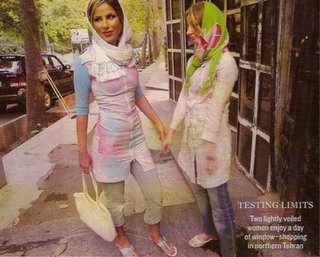THE FOUNDING FATHERS OF IRAN

THESE YOUNG WOMEN ARE THE REAL HEROS
IN THE IRANIAN DEMOCRATIC REVOLUTION
I want you to picture this, the potential danger for these young women to be out and about under the regime of Ahmadinejad in Iran. Or, of course, also, maybe the fact that these women can be out on the street dressed this way may also be a hint that Iran is not such a dangerous country as Bush and company are trying to paint it. Not only that, but why shouldn't any nation on earth have the right to develop atomic energy for their countries? After all, that's what we all ought to be doing pretty soon in order to break our dependency on oil. What? Will we only allow some carefully screened countries to develop nuclear power in order to free themselves from oil dependency? How fair is that? But, in the meantime, I’ll just call these young women heroes of the revolution.
LOLITA MAKES SENSE IN IRAN AS NOWHERE ELSE
When I was a young man, I certainly read Nabokov's Lolita and went to the "Lolita" movie with Sue Lyons—was she the star?—to be titillated. James Mason played the nasty role. Of course (saving grace!) I went on to read Nabokov's Pale Fire too and, I think, a collection of his poetry and one more novel—I think? Lot's of questions, there, but no question that I went to see "Lolita" and read the book because of the lurid press it got. Same with "Deep Throat" which was the first time I entered a porno theater. A recent documentary called "Inside Deep Throat" brought back many memories of the censorship of those days and of the horny young man I was and, also, the memory of how many average people flocked to theaters to see "Deep Throat". There's even a photo of Jackie Kennedy attending a theater which was showing the film. To date the original "Deep Throat" has grossed 600 million dollars.
Back to Lolita. The following passages are from a book review by Christopher Hitchens in Atlantic Monthly (December, 2005, p. 131). He is reviewing a book by an Iranian writer, Azar Nafisi: [OPEN QUOTE] In Azar Nafisi's Reading Lolita in Tehran, in which young female students meet in secret with Xeroxed copies of Nabokov's masterpiece on their often chaste and recently chadored laps, it is at first a surprise to discover how unscandalized the women are. Without exception, it turns out, they concur with Vera Nabokov in finding that the chief elements of the story are "its beauty and pathos." They "identify" with Lolita, because they can see that she wants above all to be a normal girl-child; they see straight through Humbert, because he is always blaming his victim and claiming that it was she who seduced him. And this perspective—such a bracing change from our conventional worried emphasis on pedophilia—is perhaps more easily come by in a state where virgins are raped before execution because the Koran forbids the execution of virgins; where the censor cuts Ophelia out of the Russian movie version of Hamlet; where any move that a woman makes can be construed as lascivious and inciting; where goatish old men can be gifted with infant brides; and where the age of "consent" is more like nine. As Nafisi phrases it,
This was the story of a twelve-year-old girl who had nowhere to go. Humbert had tried to turn her into his fantasy, into his dead love, and he had destroyed her. The desperate truth of Lolita's story is not the rape of a twelve year-old by a dirty old man but the confiscation of one individual by another. We don't know what Lolita would have become if Humbert had not engulfed her. Yet the novel the finished work, is hopeful, beautiful even, a defense not just of beauty but of life. Warming up and suddenly inspired, I added that in fact Nabokov had taken revenge on our own solipsizers; he had taken revenge on the Ayatollah Khomeini. [CLOSE QUOTE]
Imagine! Now this book with all its notoriety is seen for what it was really about when Nabokov wrote it. Nowhere but in a highly censored, repressive society do its truths ring truer. Just how repressed were we in America of the 1950s? How much now?
1 comment:
I find it interesting that all these repressions inherent in Islamic countries are inherent to the repressions the religious right would like to institute in this country. Theocracy envy?
Post a Comment